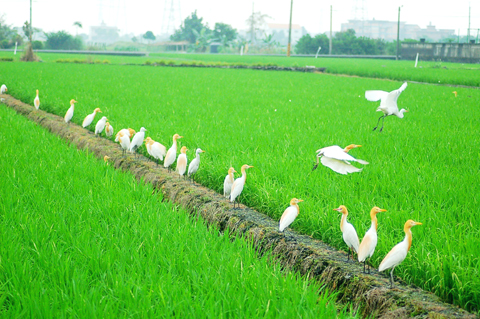Nearly 200 leaders and environmental activists from Taiwan and abroad met in Taipei yesterday at the start of a regional forum to highlight the importance of shared responsibility in protecting natural resources.
“Our interdependence is integral to our survival. Our resources as well as our responsibilities need to be equitably distributed in order to sustain the quality of life for future generations,” said the Taiwanese organizers of the Second Congress of the Asia Pacific Greens Network (APGN).
The first APGN congress was held in Kyoto in 2005, days before the Kyoto Protocol, an international agreement designed to fight global warming, came into force.

PHOTO: YANG YI-MIN, TAIPEI TIMES
“We have convened the second congress five years later — five years that have seen unprecedented growth of chaos and denial,” said Robin Winkler, a co-convener of the event and a local environmentalist, in his opening remarks.
There has been an “escalation of wars and military expansion, short-sighted corporate control of more and more of the world’s resources, media repression, and all manner of social, economic and environmental abuse,” he said.
Australian Greens leader and senator Bob Brown said that “we have a big burden on our shoulders, but a warmth in our hearts and a smile on our face. We must replace the old politics of development, consumption and greed.”
Brown showed a photograph of an Australian lake that he said had nearly disappeared 40 years ago after the construction of a dam. He said he hoped that people had learned the lesson.
High-profile participants at the conference include Tuvaluan Prime Minister Apisai Ielemia and Indian environmentalist Vandana Shiva. Both are scheduled to deliver speeches related to climate change this morning.
The three-day congress will also see discussions on major challenges, policies and strategies for dealing with climate change in the Asia Pacific region.
Organizers hope to set an eco-friendly example by using bamboo cups, cotton handkerchiefs and recycled bags at the event. They have also provided bicycles as transportation for participants. Meals are made with in-season produce and delivered with minimal packaging.
A landscape garden consisting of edible plants and a rainwater recycling system are also on display.
The forum will be streamed live on the Internet.

The Ministry of Economic Affairs has fined Taobao NT$1.2 million (US$36,900) for advertisements that exceeded its approved business scope and ordered the Chinese e-commerce platform to make corrections in the first half of this year or its license would be revoked. Lawmakers have called for stricter supervision of Chinese e-commerce platforms and more stringent measures to prevent China from laundering its goods through Taiwan as US President Donald Trump’s administration cracks down on origin laundering. The legislature’s Finance Committee yesterday met to discuss policies to prevent China from dumping goods in Taiwan, inviting government agencies to report on the matter. Democratic Progressive Party

Taiwan and its Pacific ally Tuvalu on Tuesday signed two accords aimed at facilitating bilateral cooperation on labor affairs, according to Taiwan’s Ministry of Foreign Affairs (MOFA). The governments inked two agreements in Taipei, witnessed by Foreign Minister Lin Chia-lung (林佳龍) and visiting Deputy Tuvaluan Prime Minister Panapasi Nelesone, MOFA said in a news release. According to MOFA, the agreements will facilitate cooperation on labor issues and allow the two sides to mutually recognize seafarers’ certificates and related training. Taiwan would also continue to collaborate with Tuvalu across various fields to promote economic prosperity as well as the well-being of their

Taiwan would welcome the return of Honduras as a diplomatic ally if its next president decides to make such a move, Minister of Foreign Affairs Lin Chia-lung (林佳龍) said yesterday. “Of course, we would welcome Honduras if they want to restore diplomatic ties with Taiwan after their elections,” Lin said at a meeting of the legislature’s Foreign Affairs and National Defense Committee, when asked to comment on statements made by two of the three Honduran presidential candidates during the presidential campaign in the Central American country. Taiwan is paying close attention to the region as a whole in the wake of a

NEW WORLD: Taiwan is pursuing innovative approaches to international relations through economics, trade and values-based diplomacy, the foreign minister said Taiwan would implement a “three-chain strategy” that promotes democratic values in response to US tariffs, Minister of Foreign Affairs Lin Chia-lung (林佳龍) said. Taiwan would aim to create a “global democratic value chain,” seek to capitalize on its position within the first island chain and promote a “non-red supply chain,” Lin was quoted as saying in the ministry’s written report to the Legislative Yuan submitted ahead of the legislature’s Foreign Affairs and National Defense Committee meeting slated for today. The Ministry would also uphold a spirit of mutual beneficial collaboration, maintaining close communication and consultations with Washington to show that Taiwan-US cooperation